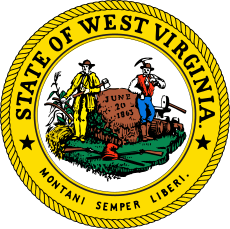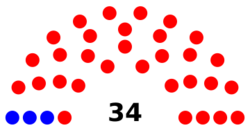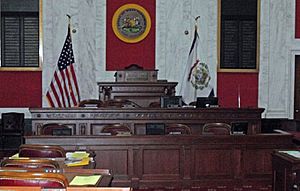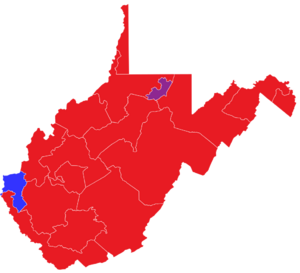West Virginia Senate facts for kids
Quick facts for kids West Virginia Senate |
|
|---|---|
| 86th West Virginia Legislature | |
 |
|
| Type | |
| Type |
Upper house of the West Virginia Legislature
|
|
Term limits
|
None |
| History | |
|
New session started
|
January 10, 2024 |
| Leadership | |
|
President
|
Craig Blair (R)
Since January 13, 2021 |
|
Donna Boley (R)
Since January 14, 2015 |
|
|
Majority leader
|
Tom Takubo (R)
Since January 9, 2019 |
|
Minority leader
|
Mike Woelfel (D)
Since January 11, 2023 |
| Structure | |
| Seats | 34 |
 |
|
|
Political groups
|
Majority
Republican (31) Minority Democratic (3) |
|
Length of term
|
4 years |
| Authority | Article VI, West Virginia Constitution |
| Salary | $20,000/year + per diem |
| Elections | |
| Plurality voting in staggered elections | |
|
Last election
|
November 8, 2022 (17 seats) |
|
Next election
|
November 5, 2024 (17 seats) |
| Redistricting | Legislative Control |
| Meeting place | |
 |
|
| Senate Chamber West Virginia State Capitol Charleston, West Virginia |
|
| Website | |
| West Virginia Legislature | |
The West Virginia Senate is an important part of the state's government. It is the "upper house" of the West Virginia Legislature, which is like the state's law-making body.
There are 34 senators in total. They are chosen from 17 different areas, called senatorial districts. Each district elects two senators. These senators serve for four years, but their terms are "staggered." This means not all senators are up for election at the same time. While the Democratic Party used to have more members, the Republicans now have most of the seats.
Contents
How the Senate Works
Getting Organized
Senators are elected for four-year terms. Because their terms are staggered, only about half of the 34 Senate seats are voted on in each election. This helps keep some experienced lawmakers in office.
The state legislature, including the Senate, meets every year. They start their regular session on the second Wednesday of January. This session usually lasts for 60 days.
Making Laws
The West Virginia Senate has a special power: it can introduce bills about money, called "revenue bills." Many other state senates cannot do this.
Here's how a bill becomes a law:
- Idea to Bill: First, an idea for a new law is written down as a bill. This is often done by special staff.
- Review: The senator who wants the bill to become a law reviews it.
- Introduction: The bill is then officially introduced in the Senate.
- Committees: Bills are sent to special groups called committees. These committees study the bill and suggest if it should pass or change.
- Readings: A bill must be read three times in the Senate.
- Approval: If the Senate approves the bill, it then goes to the West Virginia House of Delegates (the other part of the legislature) for their approval.
- Governor's Desk: If both the Senate and the House of Delegates approve the bill, it goes to the Governor. The Governor can sign it into law or veto it (reject it).
- Overriding a Veto: If the Governor vetoes a bill, the legislature can still make it a law. They can "override" the veto with enough votes, as long as they are still in session.
Senate Districts
West Virginia is divided into 17 districts for the Senate. Each district elects two senators every two years. This means each district has about 1/17th of the state's population. That's about 105,000 people per district.
Unique District Rules
West Virginia has a unique rule about its Senate districts. Both senators from the same district cannot live in the same county. For example, in the 5th District, one senator must live in Cabell County, and the other must live in the part of Wayne County that is in the 5th District. This is true even if one county has more people. However, all people in the district vote for both senators, no matter which county the senators live in.
Changing Districts (Redistricting)
Every ten years, after the United States Census counts the population, the Senate redraws its district maps. This is called redistricting. It makes sure each district has about the same number of people.
- After 2010: For the first time, Kanawha County was split into two districts. This meant fewer senators came from Kanawha County.
- After 2020: The Senate drew new maps again. This reflected how the population had moved, especially to areas like Morgantown and the Eastern Panhandle. Ten counties were split between two districts, and Kanawha County was split among three.
Because senators serve four-year terms, these new district maps don't fully take effect right away. For example, after the 2020 Census, some senators elected in 2020 under the old map continued to serve until 2024, while new senators elected in 2022 were chosen under the new map.
Senate President
The Senate members choose one of their own to be the Senate President. The current president of the West Virginia Senate is Craig Blair.
The West Virginia Constitution doesn't directly create the title of "lieutenant governor." However, West Virginia law says that the Senate President also acts as the lieutenant governor. This means the Senate President is next in line to become Governor if something happens to the current Governor (like if they resign or can no longer serve).
The constitution says that if the Governor's office becomes empty, the Senate President will act as Governor. But if the Governor's term hasn't passed three years yet, a new election for Governor will be held to fill the spot.
Current Members of the Senate

86th Legislature (2023–2024)
The table below shows how many members each political party has in the Senate over time. Currently, the Republican Party holds a large majority of seats.
| Affiliation | Party
(Shading indicates majority caucus)
|
Total | ||
|---|---|---|---|---|
| Republican | Democratic | Vacant | ||
| Beginning of the 82nd Legislature | 18 | 16 | 34 | 0 |
| End of the 82nd Legislature | ||||
| Beginning of the 83rd Legislature | 22 | 12 | 34 | 0 |
| End of the 83rd Legislature | ||||
| Beginning of the 84th Legislature | 20 | 14 | 34 | 0 |
| End of the 84th Legislature | ||||
| Beginning of the 85th Legislature | 23 | 11 | 34 | 0 |
| End of the 85th Legislature | ||||
| Beginning of the 86th Legislature | 30 | 4 | 34 | 0 |
| December 1, 2022 | 31 | 3 | ||
| Latest voting share | 91.2% | 8.8% | ||
Leaders of the 86th West Virginia Senate
These are the main leaders in the West Virginia Senate for the current session:
| Position | Name | Party | District | County |
|---|---|---|---|---|
| Senate President/Lieutenant Governor | Craig Blair | Republican | 15th | Berkeley |
| President pro tempore | Donna Boley | Republican | 3rd | Pleasants |
| Majority Leader | Tom Takubo | Republican | 17th | Kanawha |
| Minority Leader | Mike Woelfel | Democratic | 5th | Cabell |
| Majority Whip | Ryan Weld | Republican | 1st | Brooke |
| Minority Whip | Robert Plymale | Democratic | 5th | Wayne |
Committee Leaders
Committees are small groups of senators who focus on specific topics like education or finance. They help review bills before the full Senate votes on them. Each committee has a Chair and a Vice Chair who lead the discussions.
| Committee | Chair | Vice Chair |
|---|---|---|
| Agriculture & Natural Resources | Bill Hamilton | Vince Deeds |
| Banking and Insurance | Mike Azinger | Mike Oliverio |
| Confirmations | Donna Boley | Laura Chapman |
| Economic Development | Glenn Jeffries | Patrick Martin |
| Education | Amy Grady | Charles Clements |
| Energy, Industry, & Mining | Randy Smith | Ben Queen |
| Enrolled Bills | Jack Woodrum | Rollan Roberts |
| Finance | Eric Tarr | Rupie Phillips |
| Government Organization | Jack Woodrum | Jason Barrett |
| Health & Human Resources | Mike Maroney | Tom Takubo |
| Judiciary | Charles Trump | Ryan Weld |
| Military | Ryan Weld | Vince Deeds |
| Outdoor Recreation | Mark Maynard | Jay Taylor |
| Pensions | Eric Nelson | Mark Hunt |
| Rules | Craig Blair | Tom Takubo |
| School Choice | Patricia Rucker | Mark Maynard |
| Transportation & Infrastructure | Charles Clements | Mike Stuart |
| Workforce | Rollan Roberts | Glenn Jeffries |
Members of the 86th West Virginia Senate
This table lists all the current senators, their districts, and which party they belong to. It also shows when their next election is.
| District | Next Election | Senator | Party | Since | Residence | Home Cty. | Counties represented |
|---|---|---|---|---|---|---|---|
| 1 | 2026 | Laura Chapman | Republican | 2022 | Wheeling | Ohio | Brooke, Hancock, Marshall, Ohio |
| 2024 | Ryan Weld | Republican | 2016 | Wellsburg | Brooke | ||
| 2 | 2026 | Charles H. Clements | Republican | 2016 | New Martinsville | Wetzel | Doddridge, Marion, Marshall, Monongalia, Wetzel, Tyler |
| 2024 | Mike Maroney | Republican | 2016 | Glen Dale | Marshall | ||
| 3 | 2026 | Mike Azinger | Republican | 2016 | Vienna | Wood | Pleasants, Ritchie, Wirt, Wood |
| 2024 | Donna Boley | Republican | 1985 | St. Marys | Pleasants | ||
| 4 | 2026 | Eric Tarr | Republican | 2018 | Scott Depot | Putnam | Cabell, Jackson, Mason, Putnam |
| 2024 | Amy Grady | Republican | 2020 | Leon | Mason | ||
| 5 | 2026 | Mike Woelfel | Democratic | 2014 | Huntington | Cabell | Cabell, Wayne |
| 2024 | Robert H. Plymale | Democratic | 1992 | Ceredo | Wayne | ||
| 6 | 2026 | Mark R. Maynard | Republican | 2014 | Genoa | Wayne | McDowell, Mercer, Mingo, Wayne |
| 2024 | Chandler Swope | Republican | 2016 | Bluefield | Mercer | ||
| 7 | 2026 | Mike Stuart | Republican | 2022 | South Charleston | Kanawha | Boone, Kanawha, Lincoln, Logan |
| 2024 | Rupie Phillips | Republican | 2020 | Lorado | Logan | ||
| 8 | 2026 | Mark Hunt | Republican | 2022 | Charleston | Kanawha | Clay, Jackson, Kanawha, Putnam, Roane |
| 2024 | Glenn Jeffries | Republican | 2016 | Red House | Putnam | ||
| 9 | 2026 | Rollan Roberts | Republican | 2018 | Beaver | Raleigh | Fayette, Raleigh, Wyoming |
| 2024 | David Stover | Republican | 2020 | Maben | Wyoming | ||
| 10 | 2026 | Vince Deeds | Republican | 2022 | Renick | Greenbrier | Fayette, Greenbrier, Monroe, Nicholas, Summers |
| 2024 | Jack Woodrum | Republican | 2020 | Hinton | Summers | ||
| 11 | 2026 | Bill Hamilton | Republican | 2018 | Buckhannon | Upshur | Barbour, Braxton, Pendleton, Pocahontas, Randolph, Upshur, Webster |
| 2024 | Robert L. Karnes | Republican | 2020 | Helvetia | Randolph | ||
| 12 | 2026 | Ben Queen | Republican | 2022 | Bridgeport | Harrison | Calhoun, Gilmer, Harrison, Lewis, Taylor |
| 2024 | Patrick S. Martin | Republican | 2020 | Weston | Lewis | ||
| 13 | 2026 | Mike Oliverio | Republican | 2022 | Morgantown | Monongalia | Marion, Monongalia |
| 2024 | Mike Caputo | Democratic | 2020 | Rivesville | Marion | ||
| 14 | 2026 | Jay Taylor | Republican | 2022 | Grafton | Taylor | Grant, Hardy, Mineral, Preston, Taylor, Tucker |
| 2024 | Randy Smith | Republican | 2016 | Thomas | Tucker | ||
| 15 | 2026 | Charles S. Trump | Republican | 2014 | Berkeley Springs | Morgan | Berkeley, Hampshire, Morgan |
| 2024 | Craig Blair | Republican | 2012 | Martinsburg | Berkeley | ||
| 16 | 2026 | Jason Barrett | Republican | 2022 | Martinsburg | Berkeley | Berkeley, Jefferson |
| 2024 | Patricia Rucker | Republican | 2016 | Harpers Ferry | Jefferson | ||
| 17 | 2026 | Tom Takubo | Republican | 2014 | Charleston | Kanawha | Kanawha |
| 2024 | Eric Nelson | Republican | 2020 | Charleston | Kanawha |
See also
 In Spanish: Senado de Virginia Occidental para niños
In Spanish: Senado de Virginia Occidental para niños
 | Dorothy Vaughan |
 | Charles Henry Turner |
 | Hildrus Poindexter |
 | Henry Cecil McBay |

